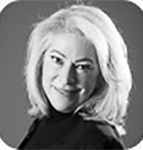Trust Your Hidden Superpowers


Welcome back to our Women in Asset Management Blog Series. This ongoing discussion on timely investing topics features the unique perspectives of successful female advisors in this traditionally male-centric industry. Today we’re speaking with Michelle Smith, Chief Executive Officer of Source Financial Advisors.
WisdomTree: Michelle, when did you decide this was the profession for you?
Michelle Smith: I was 19 and my mindset was marketing, marketing, marketing when this came to me as a surprise. This was in the late-70s when my mom was in the middle of her second divorce, from my stepfather. Her background was in teaching, and she had her own nursery school. My stepfather owned a shoe store, but it was my mother who opened a second location. One day in the midst of my mom navigating the divorce, my cousin, who was the chair of government bonds at Merrill Lynch, came over to our house. He sat her down and said, “What you are is an entrepreneur, and I think you’d be perfect in a financial advisor brokerage program we have at Merrill.” She went for it, crushed the interview and began a new career. In the early/mid-80s, I spent every summer during college working with her in the Colgate Palmolive Building on Park Avenue. At 19, 20 years old I went to work every day right next door at Saks 5th Ave. It was all sparkle and excitement, and I loved it. But the best part was that I got a front-row seat to my mom’s job and what it was actually about. Until then, finance wasn’t something I understood or ever imagined I would choose, because I thought it was just about numbers and analytics. I had no idea being an FA was so personal, so much about relationships and helping people. I got hooked. I never would have chosen this unless my mother and her life circumstances, and the mentorship of this amazing family member, hadn’t swayed her to Merrill Lynch.
The big “aha” for me wasn’t just learning what it meant to be an advisor, but also that it was equally about building a business—and doing it the way you want, with your own natural skills. I couldn’t have articulated it like this at 22 years old. But I’m hoping now that young women read this and think, “Oh my God, let me really think about what I’m good at, who my natural market would be, what my life experiences are, and put it all together.” If it had been packaged to me like that I would have come out of the gate stronger. But having the best mentor in the business right in front of me all those years growing up really got me onto a moving walkway.
My mom worked in the business until she was 74 and I’m proud to say we’re still one of the few mother-and-daughter pairs on Wall Street! There are lots of fathers and sons but very few mothers and daughters.
WisdomTree: You had quite a powerful role model to follow and it’s obvious you’d also be an excellent mentor. Are you currently in a mentoring relationship?
Smith: Yes, I have a mentorship mentality throughout my business. For me, mentoring is not “here, do it my way.” I can do a brain transfer, but I don’t believe anyone should try to create a mini me. I have an excellent coach, named Beverly Flaxington, who said “You’re gonna freak people out, especially younger women, if you try to get them to fill your shoes. Have them design their own pair.” That advice has been invaluable. I believe a great financial advisor uses their life experience to become better. For me, that’s been about learning from my mom, but also drawing from the experiences of raising my son, who has Down Syndrome. He’s given me this ability to understand things with a sixth sense. I’ve developed a deep intuition that I trust much more than I would have without him. Every advisor needs to use their unique life experiences and skills, and put those unique personal superpowers to work.
WisdomTree: What is the greatest business challenge that you’re tackling today?
Smith: Oh, without a doubt, it’s succession planning. I have my own process and I’m actively doing it, but the industry as a whole has a problem with it. Remember that scene in Erin Brockovich, when the snooty lawyer with the pointy nose and bad blue suit puts her hand on her hip and says, “You mean to say you can tell me everything about every client?!” and Erin says,“Go for it!”? As the lawyer rattles off file names, Erin starts talking about the families, their phone numbers, what’s going on in the kids’ lives. THAT is what makes a phenomenal financial advisor. I’m at this 30 years, and we really become Erin Brockovich. Yeah, there’s Salesforce, there’s Red Tail. CRM. You can keep a bunch of notes. But if your practice is growing, and if you’d like to retire one day, how do you transfer your “inner Erin Brockovich-ness”—all that intimate personal knowledge—to other team members and bring them into the middle of very personal relationships? How do you do that in a way that’s synchronized? I chose that word because the process needs to look like synchronized swimming. If your clients are going to trust the peaceful transfer of power, you can’t wait until your last year to start. That’s not going to work. You have to synchronize your individual team members and your clients. I’ve built something I’m so damned proud of and I want to leave a legacy. I want to bring my people into these very intimate relationships—but that process isn’t one-size-fits-all. You have to start with the fact pattern of your business and team. What’s your superpower? How about each team member’s? In my case, I’ve got a niche business. Ninety-five percent of my clients are divorcees, and that was purposeful based on my life experience. I’m divorced twice, my mom was divorced twice, my great-grandmother left an abusive husband in the 50s. So, I grew up with this. I understand it.
WisdomTree: Is a woman advisor likely to excel in ways that male advisors won’t?
Smith: I go back to the word intimate. The advisor-client relationship is one of the most intimate a person can have. We’re solving incredibly personal problems. And that takes what I call listening between the lines—asking good questions, listening very deeply, even reading their body language. To me, that’s more of a female superpower. I think women are less apt to jump immediately to a solution to show our smarts. We’re also different than men in how we deliver advice. Are we better? I don’t know that we’re better, but I know I’m different.
I’ve got wealthy male clients who open up to me differently than they would to a male advisor. There’s an ego dynamic between men. A guy on a golf course with his male FA may portray that he has everything under control, that his life is just shy of perfect. That competitive thing can make it harder for a male client to be transparent and open up. With me, they get to the point quicker because they don’t worry about judgment. There’s less macho, less proving something, less shame or embarrassment in admitting things they haven’t planned for or might be fearing. My male Wall Street clients will open up about their fear. But women are also quick to feel a deeper comfort and intimacy level with me. I think they feel less judgment with a woman in general, but I also think it’s because I really listen and ask a lot of questions.
WisdomTree: Is there a particular blind spot investors have that you help them overcome?
Smith: Absolutely yes. Addressing a client’s behavioral biases and psychological influences with money. Not doing that is the number-one mistake I see advisors and clients make. Behavioral finance is a discipline the industry is finally starting to value, and I think it’s incredibly important. Think about it. Everything advisors have been dealing with the last two years is about what comes out of people when they’re under extreme duress. The pandemic turned everything upside down. There’s a behavioral part of you that’s always operating in the background, preventing you from making good decisions in times of financial stress. But people are unable to face or even articulate their worst habits. If you're not going to discuss that with clients, they are going to hurt themselves—no matter what information they have. You can show them charts of the past six recessions and what happened afterward. But every crisis has its own trigger in people that taps our fear of running out of money. I‘ll say, “I understand how this feels right now. But I think you’re confusing a temporary loss of capital with a permanent one. Do you believe this situation is going to cause a permanent loss of capital in your portfolio?” When I frame it like that, like it’s all or nothing, their answers are telling. Whatever's operating in their subconscious comes out. That moment helps them regain perspective. If you pose that question and a client ever answers “yes,” you need to be explaining their portfolio a lot better. I feel my job is to educate clients that risk does not mean reckless—your reckless behavior could be your biggest risk.
WisdomTree: Are there any final thoughts you’d like to share before we finish?
Smith: WisdomTree made the conscious decision to highlight the superpowers of women in this business, and I’m so glad I could be a part of it. We need helpful content like this for women, so thank you. We’re not better than men, but we have different superpowers. We’re really, really good at this.


